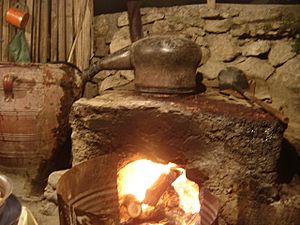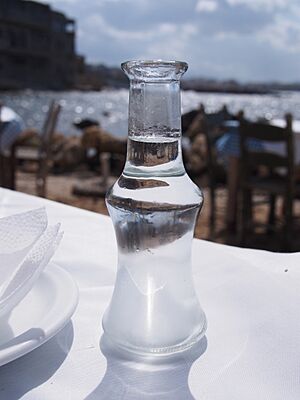Tsikoudia facts for kids
Tsikoudia (pronounced tsee-koo-DYAH) is a special beverage from the island of Crete in Greece. It's also often called raki in the eastern part of Crete. This fragrant drink is made from grapes and is a type of pomace brandy. It's a very traditional part of Cretan culture.
Contents
What is Tsikoudia?
Tsikoudia is a clear, strong drink made from grapes. It's known for its unique smell and taste. People in Crete have been making it for a very long time. It's similar to other traditional drinks found in different countries.
How is Tsikoudia Made?
Tsikoudia is made using the parts of grapes left over after making wine. These leftovers are called "pomace."
- First, the grapes are pressed to get their juice for wine.
- The remaining grape skins, seeds, and stems (the pomace) are collected.
- This pomace is then put into a tightly sealed barrel.
- It stays there for about six weeks to ferment. This means natural yeasts turn the sugars into alcohol.
- After fermenting, the pomace is distilled. This is a process where the liquid is heated to separate the alcohol.
- The steam is collected and cooled, turning back into a liquid. This liquid is tsikoudia.
This process is often done at home in villages across Crete. Because of this, the exact strength of the drink can be different from one maker to another. Usually, a few people in each village have a special license to make it. They produce tsikoudia for a few weeks in late October and early November.
Where is Tsikoudia Found?
Tsikoudia comes from Crete, which is the largest island in Greece. It's a very popular drink there. While it's called tsikoudia in most of Crete, in the eastern parts of the island, many people call it raki.
How is Tsikoudia Used?
Tsikoudia is often served chilled, sometimes straight from a freezer. It's commonly offered after a meal as a digestif. This means it's a drink meant to help with digestion. In many restaurants and tavernas in Crete, tsikoudia is given for free to customers after their meal. It often comes with fresh fruits or sweets. Sometimes, people add flavors to tsikoudia. These can include lemon peel, rosemary, or honey. When honey is added, it's called rakomelo.
Similar Drinks Around the World
Tsikoudia is part of a family of drinks made from grape pomace found in many countries. Here are some similar drinks:
- Tsipouro from mainland Greece
- Rakia from countries like Albania, Bulgaria, and North Macedonia
- Orujo from Spain
- Grappa from Italy
- Marc from France
- Chacha from Georgia
- Bagaceira from Portugal
See also
 In Spanish: Tsikoudia para niños
In Spanish: Tsikoudia para niños
 | George Robert Carruthers |
 | Patricia Bath |
 | Jan Ernst Matzeliger |
 | Alexander Miles |



